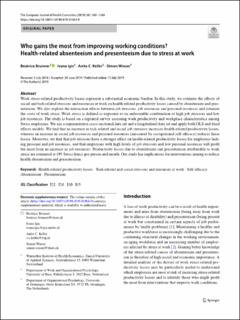Please use this identifier to cite or link to this item:
https://doi.org/10.21256/zhaw-18607Full metadata record
| DC Field | Value | Language |
|---|---|---|
| dc.contributor.author | Brunner, Beatrice | - |
| dc.contributor.author | Igic, Ivana | - |
| dc.contributor.author | Keller, Anita C. | - |
| dc.contributor.author | Wieser, Simon | - |
| dc.date.accessioned | 2019-10-31T14:47:08Z | - |
| dc.date.available | 2019-10-31T14:47:08Z | - |
| dc.date.issued | 2019 | - |
| dc.identifier.issn | 1618-7598 | de_CH |
| dc.identifier.issn | 1618-7601 | de_CH |
| dc.identifier.uri | https://digitalcollection.zhaw.ch/handle/11475/18607 | - |
| dc.description.abstract | Work stress-related productivity losses represent a substantial economic burden. In this study, we estimate the effects of social and task-related stressors and resources at work on health-related productivity losses caused by absenteeism and presenteeism. We also explore the interaction effects between job stressors, job resources and personal resources and estimate the costs of work stress. Work stress is defined as exposure to an unfavorable combination of high job stressors and low job resources. The study is based on a repeated survey assessing work productivity and workplace characteristics among Swiss employees. We use a representative cross-sectional data set and a longitudinal data set and apply both OLS and fixed effects models. We find that an increase in task-related and social job stressors increases health-related productivity losses, whereas an increase in social job resources and personal resources (measured by occupational self-efficacy) reduces these losses. Moreover, we find that job stressors have a stronger effect on health-related productivity losses for employees lacking personal and job resources, and that employees with high levels of job stressors and low personal resources will profit the most from an increase in job resources. Productivity losses due to absenteeism and presenteeism attributable to work stress are estimated at 195 Swiss francs per person and month. Our study has implications for interventions aiming to reduce health absenteeism and presenteeism. | de_CH |
| dc.language.iso | en | de_CH |
| dc.publisher | Springer | de_CH |
| dc.relation.ispartof | The European Journal of Health Economics | de_CH |
| dc.rights | https://creativecommons.org/licenses/by/4.0/ | de_CH |
| dc.subject | Absenteeism | de_CH |
| dc.subject | Health-related productivity loss | de_CH |
| dc.subject | Self-efficacy | de_CH |
| dc.subject | Task-related and social stressors and resources at work | de_CH |
| dc.subject.ddc | 158: Angewandte Psychologie | de_CH |
| dc.subject.ddc | 331: Arbeitsökonomie | de_CH |
| dc.title | Who gains the most from improving working conditions? : health-related absenteeism and presenteeism due to stress at work | de_CH |
| dc.type | Beitrag in wissenschaftlicher Zeitschrift | de_CH |
| dcterms.type | Text | de_CH |
| zhaw.departement | School of Management and Law | de_CH |
| zhaw.organisationalunit | Winterthurer Institut für Gesundheitsökonomie (WIG) | de_CH |
| dc.identifier.doi | 10.1007/s10198-019-01084-9 | de_CH |
| dc.identifier.doi | 10.21256/zhaw-18607 | - |
| dc.identifier.pmid | 31309366 | de_CH |
| zhaw.funding.eu | No | de_CH |
| zhaw.issue | 8 | de_CH |
| zhaw.originated.zhaw | Yes | de_CH |
| zhaw.pages.end | 1180 | de_CH |
| zhaw.pages.start | 1165 | de_CH |
| zhaw.publication.status | publishedVersion | de_CH |
| zhaw.volume | 20 | de_CH |
| zhaw.publication.review | Peer review (Publikation) | de_CH |
| zhaw.webfeed | W: Spitzenpublikation | de_CH |
| zhaw.author.additional | No | de_CH |
| Appears in collections: | Publikationen School of Management and Law | |
Files in This Item:
| File | Description | Size | Format | |
|---|---|---|---|---|
| Brunner2019_Article_WhoGainsTheMostFromImprovingWo.pdf | 1.48 MB | Adobe PDF |  View/Open |
Show simple item record
Brunner, B., Igic, I., Keller, A. C., & Wieser, S. (2019). Who gains the most from improving working conditions? : health-related absenteeism and presenteeism due to stress at work. The European Journal of Health Economics, 20(8), 1165–1180. https://doi.org/10.1007/s10198-019-01084-9
Brunner, B. et al. (2019) ‘Who gains the most from improving working conditions? : health-related absenteeism and presenteeism due to stress at work’, The European Journal of Health Economics, 20(8), pp. 1165–1180. Available at: https://doi.org/10.1007/s10198-019-01084-9.
B. Brunner, I. Igic, A. C. Keller, and S. Wieser, “Who gains the most from improving working conditions? : health-related absenteeism and presenteeism due to stress at work,” The European Journal of Health Economics, vol. 20, no. 8, pp. 1165–1180, 2019, doi: 10.1007/s10198-019-01084-9.
BRUNNER, Beatrice, Ivana IGIC, Anita C. KELLER und Simon WIESER, 2019. Who gains the most from improving working conditions? : health-related absenteeism and presenteeism due to stress at work. The European Journal of Health Economics. 2019. Bd. 20, Nr. 8, S. 1165–1180. DOI 10.1007/s10198-019-01084-9
Brunner, Beatrice, Ivana Igic, Anita C. Keller, and Simon Wieser. 2019. “Who Gains the Most from Improving Working Conditions? : Health-Related Absenteeism and Presenteeism due to Stress at Work.” The European Journal of Health Economics 20 (8): 1165–80. https://doi.org/10.1007/s10198-019-01084-9.
Brunner, Beatrice, et al. “Who Gains the Most from Improving Working Conditions? : Health-Related Absenteeism and Presenteeism due to Stress at Work.” The European Journal of Health Economics, vol. 20, no. 8, 2019, pp. 1165–80, https://doi.org/10.1007/s10198-019-01084-9.
Items in DSpace are protected by copyright, with all rights reserved, unless otherwise indicated.